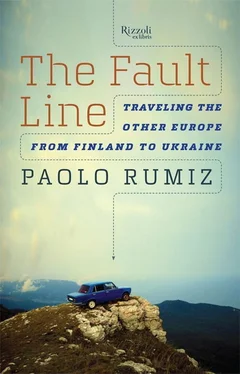We go to the station to buy two tickets to Warsaw, and we get into one of the five lines in front of five open ticket windows. Right away, the woman in front of us politely explains that she is in line for six other persons and so we should evaluate our waiting time accordingly. Then, without any preliminaries, she offers to wait on line for me too and explains that if I, by getting into another line, were to save a place for her and the others, she would be infinitely grateful.
Monika, who understands the language, immediately agrees to take part in the game, and invites me to do the same. Instantly, the mechanism is revealed. In front of the ticket windows, a strategy of “one for all, all for one” has developed in response to the uncertainty of the pee-pee breaks of the ticket vendor.
A rugby scrum could not play out any better. The five lines are processed in perfect order as though they were only one. Nobody tries to sneak in front of anybody else. I don’t know what generates this solidarity. Maybe a compassion born of a great shared pain, the suffering of a people that has experienced a century of horrors, which have left their mark on the soul. The fact remains that even the ticket vendor, faced with a stammering foreigner, me, is moved and does everything she can to help me. “Departure is at 6:30 p.m., but that is Moscow time, so you have to be here by 5:30.” And then, with a maternal gaze, “Be sure to have your passports ready, the train is on platform six.”
When I see it, I can’t believe it. The train for Poland sitting on platform six—the Kaliningrad–Gdynia–Berlin with a change in Malbork for Warsaw—is not the usual interminable procession of cars with which I crossed the tundra and the boreal taiga to get to the Baltic. It’s a sort of commuter train, small and half empty, that quickly heads toward the coastal dunes emanating terrifying noises—barks, snarls, howls, and trombone toots, a kind of concert of ghosts, a wailing of the dead that drifts across immense fields of grain, whizzes by freight yards, mountains of coal, barbed-wire fences, towers, searchlights, control bridges, and finally the windswept dunes of the Baltic, and it seems to be taking us to the ends of the Earth.
I don’t realize right away that this is a train for small-time smugglers. But when we come into the station at Braniewo—classic Prussian red brick—and the Polish customs police erupt into the car with electric screwdrivers to dismantle the bulkheads above the baggage racks and the passenger seats, I understand that this is hardball. It’s not just a customs check; it’s a face-to-face stare-down between cultures. The Russian rail personnel and the Polish police each know the language of the other, know it perfectly, but there’s no way they’ll speak it. At this checkpoint along the “wall” of united Europe, maybe they both know that they’re going through the motions to nab chicken stealers while leaving untouched the most dangerous mafia in the world.
Meanwhile, as cartons of cigarettes are popping out, even from under my seat, there begins a sequester of food. Because all food products not labeled EU are considered “impure,” sandwiches, hams, sweets, and salamis—all homemade—have to be eaten right there or thrown into a dump outside the train. Obviously, the passengers all eat as much as they can, and the car is transformed into a frantic picnic, to which the Russians invite me, too, so as not to throw away their God-given bounty. The smell of onion and cheese and the sounds of unfolding paper and munching jaws fill the train. The Polish soldiers perform this odious part of their duty with ascetic professionalism. No insults, at least, unlike when Albanians arrive in Italy and are treated like pack animals.
“Ma’am, the salami,” insists a young man in uniform to a Muscovite who won’t resign herself to giving up her treasure.
“Please, I’ve come from Moscow; I’ll never do it again. Let me keep half at least.”
“I can’t, Ma’am.”
“If you knew how good it is… you can’t get salami this good where you live. This is the best and the most expensive.”
Out of her bag comes a huge cylinder, at least three kilos of salami, and a matching smell of garlic. “Alright, I’ll give it to you.”
“Ma’am, I’m not allowed to touch it. You have to carry it outside yourself.” So the Russian woman gets up and goes out, under escort, to the Dumpster of shame. Welcome to Euroland, mesdames et messieurs.
By now the train has been stopped for an hour and a half, all for a few cartons of cigarettes and some salamis. Apparently it’s that way every time. The conductor goes to complain to the Poles. “Do your job, but please don’t say anything to the railroad people in Kaliningrad, or I’ll get fired.” He claims he’s the victim of a trap. In the meantime, one of the passengers, a Polish man, is taken into custody by the police and escorted off the train.
Now two hours have gone by. The entire car has been dismantled and the sun is going down behind the stupendous Prussian station at Braniewo. The passengers limit themselves to complaining sotto voce, emanating the infinite Russian patience. The woman whose salami was seized has also calmed down and she tells me about the magnificence of the Saint Petersburg cathedral. Even the guy who was taken off the train is released and comes back on board.
The train leaves again after dark, and right away the incredible happens.
Voicing an elegant apology, the passenger hauled off the train by the police and then put back on board starts opening, one by one, the upholstery of the uninspected seats. He rapidly pulls out the remaining cigarette cartons and puts them in a sack. Just like that, right in front of everybody. In Italy, he would have been skinned alive. Not here. The passengers—force-fed like geese, beleaguered by the seizure of their food, and punished on his account by an apocalyptic delay—discover their fellow feeling for this chicken stealer, who has to, poor guy, feed a family. “Excuse me, just for a second, get up, I have to look under here, too.”
He asks me to move just like the others, and from my seat, too, cartons of king-size American cigarettes come sliding out. “It’s even worse in Poland,” a woman from Danzig tells me. “My country is the best place in the world for thieves. They kill someone to steal twenty euros, and they get off scot-free.”

9. VISTULA
THE LITTLE TRAINheading southwest from Kaliningrad is cutting through countryside labeled with new names invented in 1945 after the defeat of Hitler in order to conceal the Prussian spirit of the places. It’s the revolution of the toponyms, adopted from the Baltic to the western half of Poland—west of the Vistula—the former German Saxony, where Halbau has become Iłowa; Naumburg am Bober, Nowogród; Sorau has been transformed into Żary, and Görlitz has sprouted Zgorzelec, on the other side of the river Neisse. The landscape, however, is magnificent—cows grazing in an azure fog, storks’ nests silhouetted against the pink sky. Nature doesn’t say that millions of Germans were forced to evacuate from here between 1944 and 1950 [6] The exile and deportation of ethnic Germans then living in eastern Poland and Czechoslovakia began in 1944 as Germans fled to the west to escape the advancing Red Army. This flight of refugees became official deportation after the Potsdam Conference in 1945, when the Allies agreed to deport Germans from the East to the Allied occupied areas of Austria and Germany. By 1950 a total of twelve million Germans had fled or been expelled from Eastern and Central Europe.
and were replaced by others, Poles driven from their homes in the heart of the East, from lands that are now Belarus, Lithuania, and Ukraine, in a double exportation to the West.
Читать дальше













